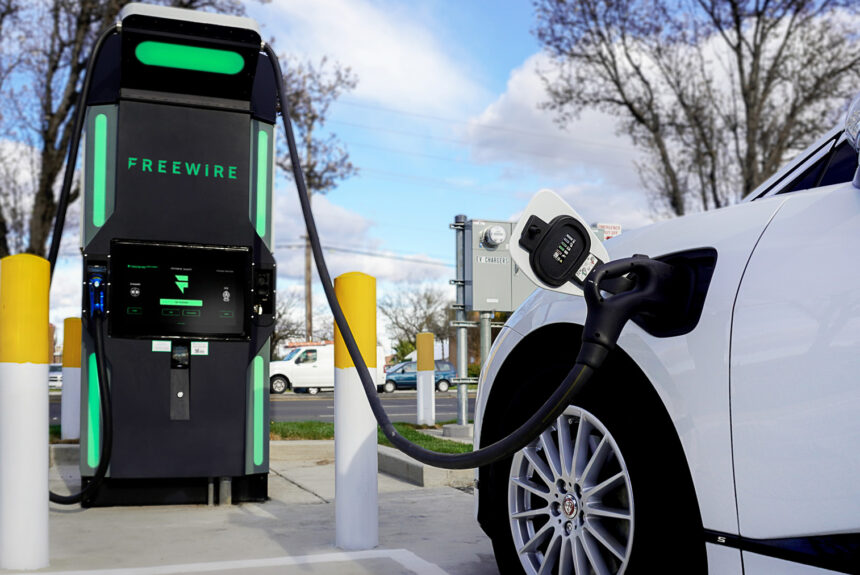An estimated two percent of consumers nationwide own electric vehicles (EVs). With the awareness of climate change growing, the adoption rate of EVs is expected to surge.
However, the current modern electric vehicle is not for everyone. While sleek in design and a “smoother” ride than your standard internal combustion engine vehicle (ICEV), many consumers are turned off by the prospect of having to wait upwards of half a day to charge their car.
>>>READ: The Biggest Obstacle to EV Sales is the Government
Enter FreeWire Technologies, a Newark, CA-based provider of battery systems for electric vehicle charging and mobile distributed power.
Founded in 2014, the company is a standout in the EV charging market, having created the first-kind-of-its-kind fully deployable EV charging solution. While typical EV chargers on the market require about eight hours to fully charge an electric car, FreeWire’s ultrafast charging technology can fill an EV battery up to 80% of its maximum capacity in as little as twenty minutes. The stationary charging stations are easy to install and require no additional infrastructure to operate, a feat that FreeWire says frees customers from the “limitations of the electric grid.” Whereas your average convenience store or gas station previously needed to spend hundreds of thousands of dollars to set up a high-powered, direct current fast charger (DCFC) on its premises (a process that takes years to build and requires loads of permits), FreeWire’s battery-integrated EV charging stations offer high-power charging and low energy costs without the pricy and time-intensive grid upgrades.
According to the company, customers who make the switch can expect 70% lower operating costs and 20% reduced installation costs compared to other ultrafast charging technologies. The lower installation costs are due to the fact that the company’s products easily mesh with the existing electric grid. That is, customers can leverage current low voltage electrical infrastructure to meet their fleet-charging and distributed energy needs as opposed to installing additional charging infrastructure.
Most importantly, the units place significantly less strain on the power grid than other standard ultrafast chargers, resulting in much lower operating expenses over the long run. This is directly correlated to how the FreeWire model draws its power. Unlike traditional EV chargers that siphon their energy from the electrical grid, FreeWire chargers primarily draw their energy from the system’s built-in battery bank. The battery-based nature of the product allows it to avoid large spikes in power that can lead to higher energy costs, specifically so-called “demand charges” typical of conventional EV charging solutions. These costs can run upwards of $20,000 a month for some companies, meaning consumers who make the switch will see large savings.
>>>READ: Spiers New Technologies is Solving One of America’s EV Woes
The company’s latest innovation, the Boost Charger 200, delivers 200 miles of range in a quarter of an hour. Reaching peak power levels of 200 kW, the Boost Charger is FreeWire’s most powerful and flexible EV charger yet. The fully-integrated charging solution features a 160-kWh battery capacity and only needs one-eight of the power input required of traditional legacy chargers. The units are suitable for high-volume commercial and retail locations such as convenience stores, parking lots, shopping malls, and gas stations. However, FreeWire eventually hopes to expand to all areas customers frequent on a daily basis as EV charging demand continues to grow.
“The global movement towards electrified transportation is accelerating. We must continue to make EV charging faster, more convenient, and more affordable than ever without sacrificing performance,” CEO and founder of FreeWire Arcady Sosinov said in a press release. “As governments continue to set ambitious and necessary electrification goals, FreeWire and our technology stand ready to meet this moment with the urgency and innovation it demands,” he added.
Investors have taken note.
The Boost Charger recently showcased as a finalist in Fast Company’s 2022 World Changing Ideas Awards’ Transportation Category. FreeWire also raised an astounding $125 million in new capital in a Series D funding round that took place in the spring.
To date, the company has raised an impressive $230 million. Asset manager BlackRock and energy giant BP are among the company’s most notable investors.
“BlackRock’s investment in FreeWire Technologies underscores our confidence in the company’s innovative product suite and its ability to accelerate EV adoption while mitigating the strain on the electric grid,” Steven Karpel, Managing Director, Fundamental Fixed Income at BlackRock said following the April funding round.
The high cost of setting up and maintaining ultrafast charging infrastructure remains the chief barrier to the mass adoption of EVs. By overcoming the industry’s “charging bottleneck,” FreeWire makes it possible for America to achieve its electrification goals.
Nathalie Voit is a freelance content creator and a graduate of the University of Florida. She is an alumni of The Heritage Foundation’s Young Leaders Program.
The views and opinions expressed are those of the author’s and do not necessarily reflect the official policy or position of C3.
